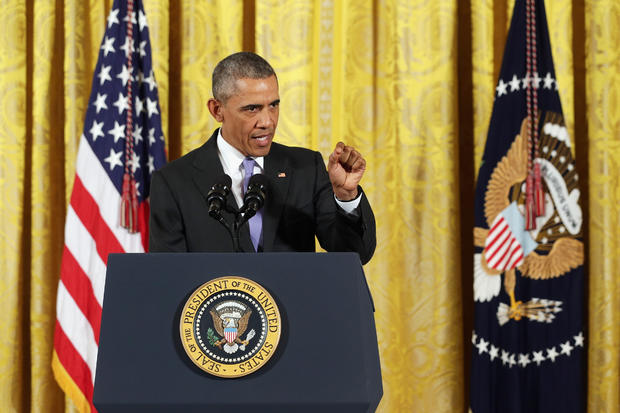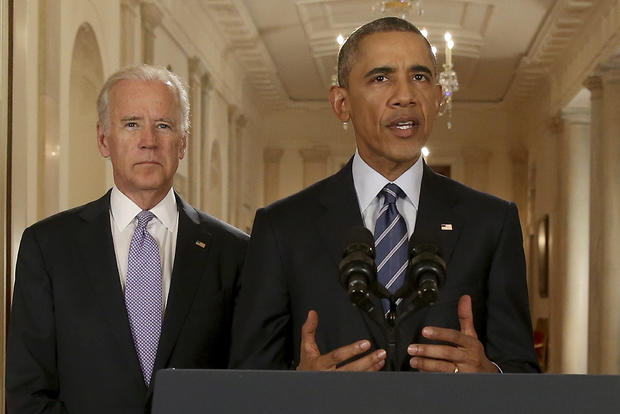5 ways Obama is trying to sell the Iran nuclear deal
On Wednesday, President Obama began the difficult task of selling the Iran nuclear deal to the American public and a deeply skeptical Congress. In an hour-long news conference, he argued that America has stopped Iran's progress on developing a nuclear bomb and countered that those who have opposed the deal have not themselves presented any reasonable alternatives.
"The president's really trying to make the case that this is a good deal, that it's going to constrain the Iranian program, that all the pathways toward a nuclear weapon have been shut off, and that it's verifiable," said CBS News Senior National Security Analyst Juan Zarate. "The critics and the skeptics will say there's lots of challenges and holes in that."
President Obama pledged Tuesday morning that he would veto any legislation that prevents successful implementation of the deal, but he'll have to work on building Democratic support since Republican opposition runs deep.
But it will be difficult, Aaron David Miller, a Middle East scholar at the Woodrow Wilson International Center for Scholars, told CBS News.
"I don't think there is an effective way to sell this agreement," he said. But the arguments the president used to pitch the deal Wednesday just might be credible "if pitched to a narrow constituency of Democrats," he said.
1: The administration succeeded in its chief goal
"I can say with confidence - but more importantly - nuclear experts can say with confidence that Iran will not be in a position to develop a nuclear bomb. We will have met our number one priority," Mr. Obama said at the press conference Wednesday.
Many critics of the deal said that the U.S. should have used its leverage to force Iran to stop sponsoring terror groups like Hezbollah and to release Americans it is holding, like Washington Post reporter Jason Rezian.
Throughout the negotiations, Mr. Obama has repeated that the U.S. negotiations over Iran's nuclear program do not mean the end of other problems with the Iranian regime. He reaffirmed Wednesday that America will not drop its sanctions related to Iran's sponsoring of terrorism, human rights violations or its ballistic missile program. But he argued Wednesday that stopping the entire deal over those issues "defies logic."
"It makes no sense and it loses sight of what was our original number one priority, which is making sure that they don't have a bomb," he said.
In a contentious debate with CBS News Chief White House Correspondent Major Garrett, Mr. Obama also argued that it would have made the U.S. weaker to tie together the nuclear negotiations with imprisoned Americans.
"Suddenly, Iran realizes, you know what, maybe we can get additional concessions out of the Americans by holding these individuals. It makes it much more difficult for us to walk away if Iran somehow thinks that a nuclear deal is dependent in some fashion on the nuclear deal," the president said. "And, by the way, if we had walked away from the nuclear deal, we'd still be pushing them just as hard to get these folks out. That's why those issues are not connected."
2. It’s this...or it’s war
"Either the issue of Iran obtaining a nuclear weapon is resolved diplomatically through a negotiation or it's resolved through force, through war," Mr. Obama said Wednesday. "Those are the options."
The president believes the deal is the only option available short of a war with Iran, and in the U.S., appetite for another conflict in the Middle East is low. In a March poll, CBS News found that just 29 percent of Americans think Iran's nuclear program is a problem that requires immediate military action, even though three in four say it's a threat to the U.S.
It's the kind of argument that Mr. Obama's critics hate, and Zarate predicted this instance would be no different.
"I think the critics will say look the either/or scenario of this deal or war is a straw man argument," Zarate said. "You could have negotiated harder at the table."
Miller echoed that idea, saying it won't resonate with the Republicans in Congress who will try to block the president from waiving the sanctions - or with Israelis and Saudis, who have also been openly critical of the deal.
The one place the argument might work, Miller said, is with congressional Democrats.
"That argument that, 'look guys, if you block me on this, you're going to have to assume responsibility for the consequences,' - that is a Democratic argument, and in the end that may well be the most persuasive argument," he said. "That and the fact that a lot of Democrats will look at the Republicans and say, 'they're not really legitimate critics of the president. They're going to say no to anything.'"
At the end of the day, he said, he believes Mr. Obama still has the advantage because not enough Democrats will want to block the deal in case the president is right about the choice between that and war.
3. What’s your alternative?
Many of the arguments the president made Wednesday were aimed at the Democrats he needs to support him. This one was specifically for his most vocal critics: Republicans and Israeli Prime Minister Benjamin Netanyahu.
"I'm hearing a lot of talking points being repeated about, 'This is a bad deal. This is a historically bad deal. This is a historically bad deal. This will threaten Israel and threaten the world and threaten the United States.' I mean, there's been a lot of that," Mr. Obama said Wednesday. "What I haven't heard is, what is your preferred alternative?"
That's a challenge that's also aimed at the huge field of Republican presidential candidates vying to replace him in the White House. Not a single one supported the deal, including Sen. Rand Paul, R-Kentucky, who is more open to the idea of negotiating with Iran than any of his colleagues.
Mr. Obama went so far as to argue that a future president will face a weaker Iran than he faced for most of his presidency. When portions of the agreement expire in 10 or 15 years, he said, the U.S. will have a much better understanding of Iran's nuclear program and the "breakout time" - the amount of time it would take Iran to assemble a nuclear weapon - would still be at least a year, longer than the White House believes it is today.
"If at that point, they've finally decided, you know what, we're going to cheat, or not even cheat, at that point they decide openly, 'We're now pursuing a nuclear weapon,' they're still in violation of this deal and the commitments they've made internationally. And so we are still in a position to mobilize the world's community to say, 'no, you can't have a nuclear weapon,'" the president said Wednesday. "And they're not in a stronger position to get a nuclear weapon at that point. They are in a weaker position than they are today. And by the way, we haven't given away any of our military capabilities. We're not in a weaker position to respond."
4. Iran’s additional financial resources will not be a game-changer
One of the reasons former Florida Gov. Jeb Bush said he objects to the nuclear deal is because it would "would provide more than $100 billion in sanctions relief that will breathe new life into Iran's malevolent and corrupt regime."
Of the money that will flow into Iran once the United States and European Union lift their sanctions, Mr. Obama called it a substantial sum, but not so high that it would be worth abandoning the deal.
"Do we think that with the sanctions coming down, that Iran will have some additional resources for its military and for some of the activities in the region that are a threat to us and a threat to our allies? I think that is a likelihood that they've got some additional resources. Do I think it's a game-changer for them? No," the president concluded.
Miller argued the president's argument is not necessarily effective because "the reality is a little bit of money to Iran's clients go a long way," he said.
"Whatever revenues the Iranians end up acquiring it'll be very beneficial to Iran's clients - certainly to [Syrian President] Assad," he said.
Mr. Obama also argued that without a deal, the international sanctions regime that brought Iran to the negotiating table and crippled its economy would begin to unravel. That, Zarate said, "is really not true."
"That's a difficult part of the administration's narrative because when we started the negotiations, the sanctions regime was actually getting stronger," he said, pointing out the Israeli and Republican have pushed for keeping existing sanctions in place and adding new sanctions, either as an alternative or as leverage for a better deal.
5. The U.S. still has ways to control Iran’s access to conventional weapons
Another concession the U.S. made in Vienna that has been troubling to the deal's critics has to do with conventional weapons. Part of the agreement will roll back embargoes on Iran's ability to import and export conventional arms and ballistic missiles. Martin Dempsey, the outgoing chairman of the Joint Chiefs of Staff, said at a hearing before the Senate Armed Services Committee last week that "under no circumstances" should the U.S. lift those bans.
"That should have just been rejected outright, but the president's defending it," Zarate said.
Mr. Obama argued that the U.S. has other ways to block Iran's arms dealings, such as United Nations resolutions that will not be lifted and multilateral agreements in the region.
"We've had belts and suspenders and buttons, a whole bunch of different legal authorities. These legal authorities under the nuclear program may lapse after five or eight years, but we'll still be in possession of other legal authorities that allow us to interdict those arms," Mr. Obama said.
Plus, he said the "real problem" is that Iran gave weapons to terror groups like Hezbollah illegally.
"There was insufficient intelligence, or capacity, to stop those shipments," he said. "I share the concerns of Israel, Saudis, Gulf partners about Iran shipping arms and causing conflict and chaos in the region. And that's why I've said to them, let's double down and partner much more effectively to improve our intelligence capacity and our interdiction capacity so that fewer of those arms shipments are getting through the net."

